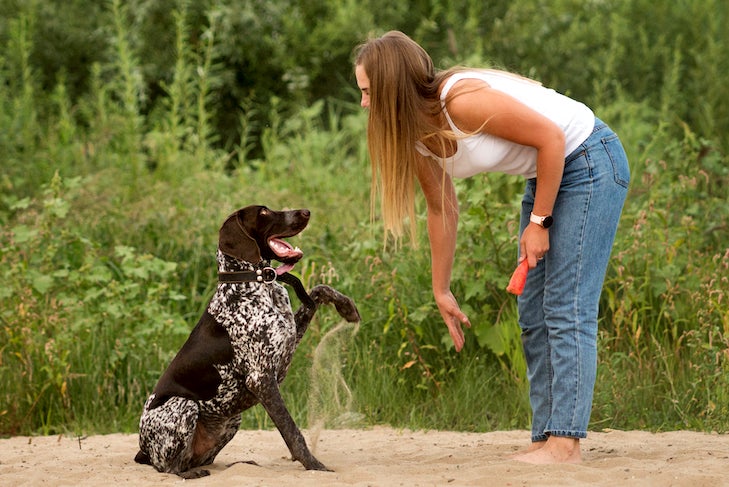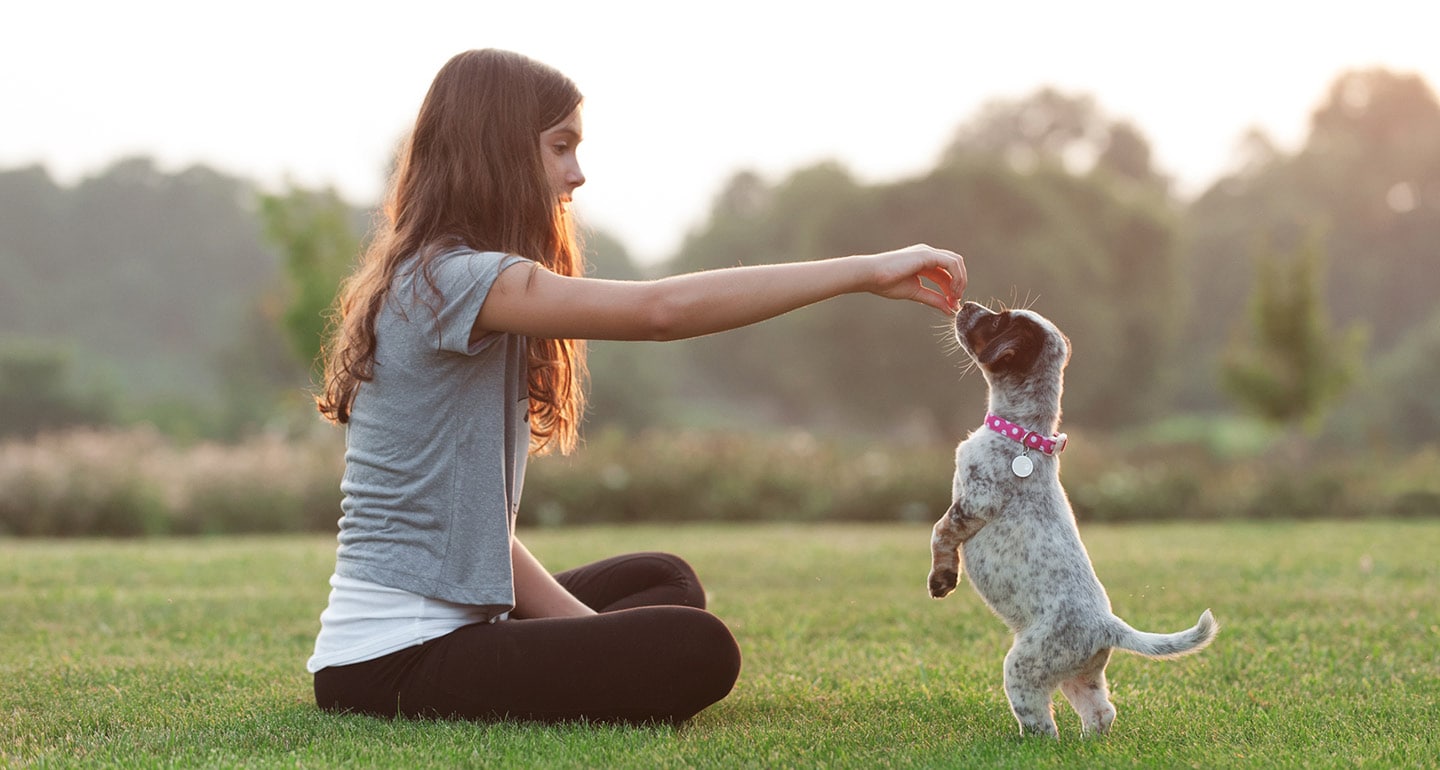The Ultimate Overview to Pet Training: Building a Satisfied, Obedient Pet Dog
Reliable canine training is a diverse procedure that rests on a deep understanding of canine actions and the application of tried and tested techniques. By accepting favorable reinforcement and constant command usage, animal owners can grow not only obedience however also a solid, trusting partnership with their pet dogs. However, the journey does not finish with basic commands; attending to behavior issues and developing a nurturing training setting are similarly important parts. As we explore these components, it comes to be apparent that the path to a content and mannerly canine companion might hold a lot more complexities than one may originally presume.

Understanding Pooch Actions
Just how does a pet dog's habits show its mental and psychological state? A dog's actions can serve as a home window right into its feelings, demands, and total emotional well-being.
Body language also plays an essential role in comprehending canine habits. A kicked back position and open mouth signal comfort, whereas tense muscular tissues and pinned ears might suggest anxiousness or aggression. Observing these signals is vital for determining the origin triggers of a dog's habits, whether it stems from anxiety, excitement, or disappointment.
In addition, a dog's communication with its setting and other animals can offer understanding right into its mood. A pet that involves playfully with other dogs is most likely sensation safe and social, while one that displays avoidance or aggression might be experiencing stress and anxiety or instability. Comprehending these behavior cues is essential for promoting a strong partnership between the pet and the proprietor, eventually adding to the pet's emotional health and well-being.
Important Training Strategies
Efficient dog training strategies are necessary for promoting desirable actions and enhancing the bond between a dog and its proprietor. Utilizing positive support is among the most efficient techniques, where rewards such as treats, appreciation, or playtime are provided to enhance wanted habits (dog training near me). This urges the dog to duplicate those behaviors, creating a positive learning setting
Consistency is one more crucial aspect in dog training. Commands need to be clear and uniform, and all relative need to use the exact same rules to stay clear of puzzling the dog. Timing is similarly essential; incentives ought to be given immediately after the wanted behavior to develop a clear connection in between the action and the incentive.
In addition, appealing and brief training sessions work, as dogs have differing interest spans. Goal for sessions of 5 to 15 mins, relying on the pet's age and energy degree. Integrating play into training can likewise enhance motivation and enjoyment for both the pet and the proprietor.
Lastly, persistence is crucial. Dogs learn at their very own speed, and preserving a calm disposition will help ease aggravation, making sure a favorable training experience. These important strategies lay the foundation for successful pet training and an unified partnership.
Fundamental Commands to Instruct

When instructing these commands,Uniformity and favorable support are crucial. Usage treats, appreciation, and play to award your dog's successes. Short, constant training sessions are more reliable than long, occasional ones. By instilling these standard commands, proprietors equip their dogs with the abilities needed for a well-behaved and harmonious relationship.
Addressing Typical Behavioral Issues
Understanding and addressing usual behavior problems in dogs is vital for fostering an unified partnership between animals and their proprietors. Many pets display behaviors such as excessive barking, eating, or aggression, which can come from stress and anxiety, boredom, or absence of appropriate training. Identifying the origin cause of these behaviors is the first step towards efficient treatment.
For example, excessive barking may suggest a demand for attention or a reaction to environmental stimulations. In such cases, owners must assess the pet dog's atmosphere and provide sufficient psychological excitement, such as interactive playthings or normal exercise. Chewing can typically be taken care of by rerouting the habits to ideal eat products and making certain that the dog has adequate exercise to reduce monotony.
Aggressive behavior requires cautious handling and may require specialist training support. It's crucial to comprehend that penalty can intensify anxiousness and aggression, resulting in a cycle of behavior problems. Rather, concentrate on look at this web-site positive reinforcement strategies to reward desirable habits and enhance a sense of safety.
Structure a Positive Training Environment
Producing a favorable training setting is basic for strengthening preferable actions in pets and alleviating behavior concerns. This setting should be characterized by consistency, support, and a clear understanding of the training purposes. By developing a regular, pets learn what is expected of them, which helps decrease stress and anxiety and complication.
Making use of favorable support strategies, such as deals with, appreciation, and play, cultivates a feeling of safety and motivation in the dog. Rewarding great actions quickly and constantly reinforces the desired activities, making the training process extra effective - dog training charlotte. Additionally, fitness instructors must stay person and tranquility, as pet dogs are delicate to their trainers' emotions
The training space ought to be without interruptions to make sure the canine can concentrate on the tasks discover this info here at hand. Take into consideration making use of a quiet space or a safe and secure exterior location. Integrating playtime and socializing right into training sessions promotes a well-shaped technique, enhancing the pet's discovering experience.
Inevitably, a positive training environment supports a strong bond in between the dog and trainer, resulting in a loyal, delighted pet. By prioritizing this setting, animal proprietors can successfully deal with behavior challenges and grow a successful training trip.
Conclusion
Effective canine training depends on a thorough understanding of canine actions and the application of positive reinforcement techniques. Embracing these concepts makes sure a fulfilling training experience for both dogs and their owners.
Effective pet dog training is a complex procedure that pivots on a deep understanding of canine behavior and the application of proven techniques. A dog that engages playfully with other dogs is likely feeling social and protected, while one that displays avoidance or hostility may be experiencing anxiety or insecurity.Efficient canine training methods are vital for promoting preferable habits and reinforcing the bond between a canine and its owner.Developing a favorable training environment is basic for enhancing preferable habits in canines and reducing behavioral issues.Reliable pet dog training depends on an extensive see this website understanding of canine behavior and the application of favorable support methods.